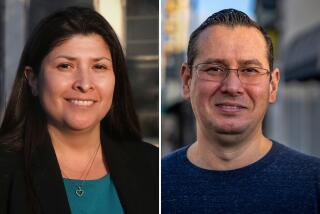Court Lets Stand Sex Harassment Suit Filed by Bystander
- Share via
SAN FRANCISCO — The state Supreme Court, broadening the grounds for sexual harassment suits, on Thursday rejected a challenge to a lower court ruling allowing an employee who witnesses abuse to seek damages, even though she herself was not the victim.
The justices, in a brief order, let stand a decision by a state Court of Appeal last October that reinstated a so-called “environmental” sexual harassment suit brought by a nurse against San Pedro Peninsula Hospital and its staff gynecologist.
The appeal court, in the first ruling of its kind in California, said that bystanders can collect often-sizable punitive damages from an employer if they can show harassment is “pervasive” or “severe” in the workplace.
The ruling was challenged by hospital groups and other employers, which warned that the decision was so far-reaching in effect that it could allow lawsuits by employees who take offense at the ill-concealed love affairs of co-workers.
The nurse, Julie Fisher of Rancho Palos Verdes, contended that the physician, Dr. Barry H. Tischler, engaged in repeated acts of harassment with other women employees, pulling nurses onto his lap, hugging and kissing them, touching their breasts and making other sexual advances. Fisher said she found the doctor’s actions so disconcerting that she suffered headaches, stomachaches and diarrhea.
Both Tischler and the hospital denied the allegations made by Fisher.
Thursday’s refusal by the justices to review the case allows the appellate decision to become binding on trial courts throughout the state.
Pamela E. Dunn, a Los Angeles lawyer representing Tischler, said she was “shocked and appalled” at the high court’s action. “It’s going to have an absolutely horrible effect on employers. To say someone can sue for something she sees in the workplace, without even first making clear such conduct is unwelcome, is really going to chill relations between the sexes.”
Irving H. Greines of Los Angeles, representing the California Medical Assn. and a group of hospital and health care providers, expressed hope that the high court eventually will take another look at the issue. “Nobody tolerates sex harassment,” said Greines. “But there’s a serious public policy question of whether a bystander should be able to sue for harassment against someone else.”
The attorney for Fisher was unavailable for comment.
The suit was filed in Long Beach Superior Court in 1987. Fisher contended that six years before, Tischler had made insulting sexual comments and offensive physical contacts, once hugging her so tightly it separated cartilage from her ribs. She complained to hospital officials and the doctor formally apologized, she said.
But later, Fisher contended, Tischler continued to make offensive statements and engage in offensive activity with other female employees. In one instance, the physician made lewd remarks about the breasts of anesthetized female patients, she said. Hospital officials were informed about Tischler’s alleged actions but took no steps, she said. Meanwhile, Fisher was ostracized by supervisors and co-workers, her suit contended.
Superior Court Judge James Sutton Jr. dismissed the suit, saying a bystander in such circumstances could not seek damages for the harm suffered by others. “Vicarious disgust is not actionable in the context of sexual harassment--there must be a ‘harassor’ and a ‘harassee,’ ” Sutton said.
However, a state Court of Appeal in Los Angeles reversed the ruling, saying that Fisher could sue as a bystander in a “hostile work environment” even though she was not the target of offensive remarks or physical contacts. To do so, however, Fisher must prove she personally witnessed sexual harassment in her immediate surroundings and show that such activity created an abusive working environment, the panel said.
More to Read
Sign up for Essential California
The most important California stories and recommendations in your inbox every morning.
You may occasionally receive promotional content from the Los Angeles Times.










